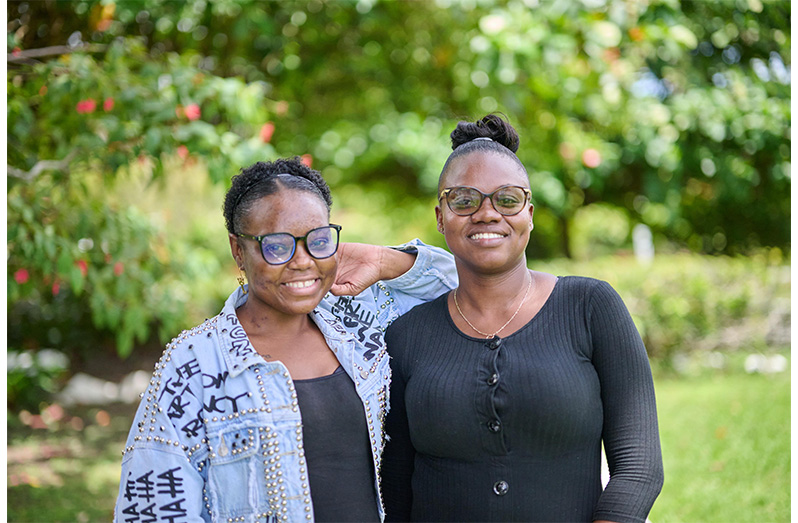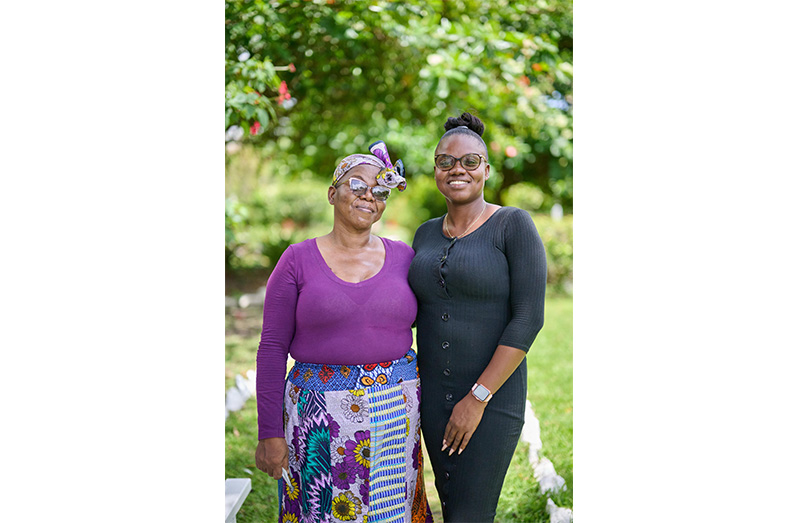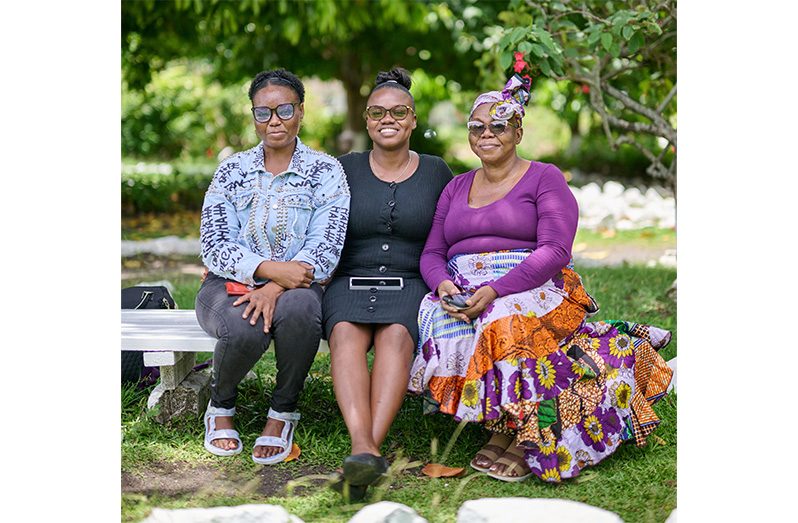A groundbreaking kidney transplant brings strangers together in an unexpected sisterhood.
By Shaniya Harding
THEY started as strangers, but today, Yvette Joseph, Kenisha Pellew, Nikita Caines, and Jamaicy McAllister share a bond so deep it mirrors that of a family. For these four women, Guyana’s fifth and most recent paired kidney transplant didn’t just offer a second chance at life—it created lifelong connections and a new sense of purpose.
At first glance, the way Yvette, her daughter Kenisha, and Nikita interact makes you think they have known each other forever. But just months ago, they were simply individuals struggling through the harsh reality of kidney failure. Fifty-two-year-old Yvette and twenty-seven-year-old Nikita had both spent years on dialysis, desperately awaiting a solution, yet neither had a compatible donor. Yvette’s daughter, Kenisha, and Nikita’s step-sister, Jamaicy wanted to help but were unfortunately not a match.

That’s when a team at the Georgetown Public Hospital Corporation stepped in with a bold idea: a paired exchange transplant. Also called a kidney swap, this innovative procedure involves incompatible donor-recipient pairs being matched with others in a similar situation. In this case, Kenisha’s kidney was successfully transplanted into Nikita, while Jamaicy’s kidney went to Yvette. Miraculously, the cross-matches worked—and so did the surgeries. These women didn’t just gain healthier futures; they found something unexpected in the hospital corridors: sisterhood.
Fighting to Find a Match
When Yvette Joseph first learned she had kidney failure in February 2023, the road ahead seemed uncertain. “I was there back and forth considering if to do dialysis or not to do dialysis. Dialysis, for me, I never liked dialysis because after doing dialysis, the feelings that I used to get, it wasn’t a nice one,” she recalled. While others seemed to handle the treatment with ease, her body struggled. “Some persons, after dialysis, they’re strong and healthy, and they’re good to go, but I wasn’t like that,” she shared during her interview with Pepperpot Magazine.

After some time of fighting a good fight, the doctors at the Georgetown Public Hospital Corporation decided that Yvette would be a good candidate for a kidney transplant. Looking for a new way of life, she joined the list enthusiastically. That decision would change her life and intertwine it with strangers-turned-family. But it wasn’t a straightforward path. Although Yvette did have children as well as extended family willing to donate, they were either not a match or not in the physical condition to donate—with factors such as alcohol usage and smoking being a big factor in organ donation.
“So I know a lot of persons out there may say they don’t have a match. You don’t have to get a match. You just get somebody willing to donate a kidney for you, and they will find a match for you,” Yvette shared.
That willingness came in the form of a paired donation system. On the other end of this chain was Nikita Caines, a twenty-seven-year-old woman who had been battling kidney issues since she was a child. “My first experience with kidney failure, I was nine when I actually knew exactly everything about it,” she shared. Diagnosed with nephrotic syndrome, Nikita endured years of dialysis, starting with peritoneal dialysis and then moving on to haemodialysis when the catheter failed. “Our doctor told us we were going to do a chain match, which was supposed to be three of us,” she further explained, “so it ended up becoming a pair match, where Kenisha gave it to me, and my sister gave it to Miss Yvette.”
The Journey to Transplant
Twenty-seven-year-old Kenisha Pellew had never imagined being part of such a life-changing experience. But when her mother asked for help, she didn’t hesitate. “At the point where, when ‘mom’ came to us, and she said that if anyone is willing to donate a kidney to her, we have to do the different blood tests,” she shared. “Between ourselves, it’s eight of us, so we were trying to figure out whose blood matched mommy’s.”
Although her blood type wasn’t a direct match, a paired donation system made the transplant possible, and even though her kidney was not going to her mother, Kenisha knew that the procedure would ultimately save her mother’s life. “I said I’m going to go ahead and do it if I can. Once it’s going to save my mom’s life, fine. I will go ahead and do it,” Kenisha said.
But just like Yvette’s journey, there were bumps in the road. “The night before the surgery, we had a little hiccup,” Kenisha explained. “The other donor, when they did her last blood test, it showed that she was pregnant, but there was no foetus. So, we had to cancel the surgery,” she added. Still, they pressed forward. “The doctor said, okay, we’ll have to stay in the hospital for them to run different checks and tests in order to make sure the foetus is not there, and then we can go ahead with the surgery.” Despite the delays and emotional strain, the transplant finally happened in April 2025.
From Procedure to Family
What began as a medical procedure blossomed into a bond none of the women expected. “We weren’t like this at the cross-match. But it’s when we got admitted to the hospital, then my other half of me became my best friend,” Nikita said. She further shared, “I eventually called Yvette my mom because she treated me like her daughter. She’s always watching what I’m eating in the hospital, always complaining about everything I’m eating.”
The support extended beyond the operating room, and the four women even went through their recovery together with the help of medical staff. As Nikita explained, “The surgery is one part, but the aftercare, which is the most important part, taking care of your patient. I never knew that Georgetown Hospital had such caring nurses.”
Before leaving the hospital, the women were informed about the strict restrictions they had to follow on their road to recovery. “Before you get discharged, you have to know all your medication. If you don’t pass that, you can’t come out of the hospital,” Yvette explained. “You have a charge sheet that you put it on, and you send it to the doctor every day.” Both women are now living with renewed health and deep gratitude.
Today, Yvette, Kenisha, Nikita, and Jamaicy are all doing well in their recovery. The bond they share continues to strengthen, rooted not only in the incredible medical journey they undertook but in the emotional and spiritual support they’ve given each other along the way. As they move forward with healthier lives, their story is a powerful reminder of what can blossom when compassion, courage, and innovation come together.




.jpg)









